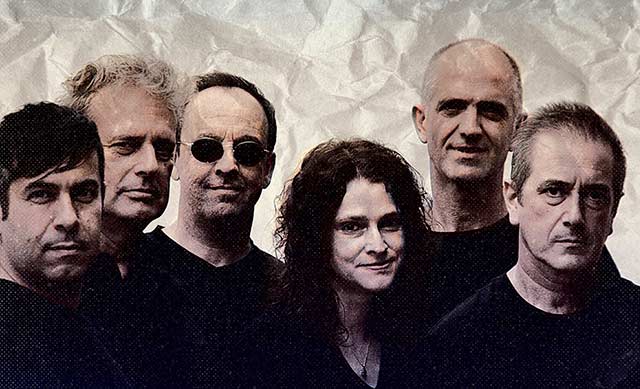It was in November 1984 that Mão Morta was formed, a Portuguese rock group from Braga, with Joaquim Pinto (bass), Miguel Pedro (guitar) and Adolfo Luxúria Canibal (vocals). Their sound calls for aggressive rock, sometimes hard, with a special emphasis on words. One of the band’s strengths is its live performances, with shows full of sound and visual violence, which make its huge legion of fans red hot.
The group’s first performance took place in 1985, at Orfeão da Foz, in Porto. This was followed by the entry of a new guitarist and, the following year, the band received the Originality award at the 3rd Modern Music Competition at the famous Rock Rendez-Vous.
Adolfo Luxúria Canibal’s performances and charisma created, from the very beginning, a very special cult around the band, combined with an irreverent and controversial attitude.
In 1988 they edit Mão Morta, the band’s first album, in charge of the publisher Ama Romanta. This record, one of the fundamentals in the list of best rock albums, includes classic themes of the band such as “Oub’lá”, “Sitiados” and “Até Cair”. The band’s success began to take shape, despite minor problems in live performances, which sometimes resulted in violence among the public.
The band then had a series of concerts, highlighting the controversial performance at Rock Rendez-Vous, in which Adolfo Luxúria Canibal took the initiative to cut himself on his leg, using a knife.
The following studio edition, Corações Felpudos (1990), already had the participation of José Pedro Moura. This album deserves excellent reviews from specialized newspapers. The following year, O.D., Rainha do Rock & Crawl, another long-lasting album, received an international release, in a clear commitment by the group to reach other markets. The album was distributed in Germany, Switzerland, Austria and the former Czechoslovakia.
Mutantes S.21 appeared in 1992 and constituted a travel diary through nine cities, but it would be “Budapest” that transported Mão Morta to the heights of fame and to the preferences of music publications at the time.
The band opted for a period of separation, only returning to recording in 1994, with the album Vénus em Chamas. The definitive consecration of the band was proved by the series of shows carried out all over the country.
The band participated in the tribute compilations to António Variações and Zeca Afonso, with critically acclaimed contributions.
In 1995, they celebrated the 10th anniversary of the band with the edition of the compilation Mão Morta Revisitada, which includes the band’s classics reconstructed, as well as unpublished themes.
In June 1996, and in recognition of the career of Mão Morta, the Centro Cultural de Belém invited the band from Braga to work on poems by Heiner Müller, regarding the world premiere of the play Germania 3, by the late German playwright, scheduled for January 1997.
“Müller no Hotel Hessischer Hof”, a musical piece staged and interpreted by Mão Morta, based on texts by Heiner Müller, had its premiere on January 6, 1997, in the small auditorium of the CCB. This show resulted in the recording of an album, Müller no Hotel Hessischer Hof, edited by NorteSul.
In 1998, the album There was a Long Time That In This Latrine the Air Became Irrespirable.
In 1999 they celebrated the band’s 15th anniversary with a performance at the sold-out Coliseu dos Recreios, in Lisbon.
The year 2000 began with the release of Primavera de Destroços, considered by many to be the band’s best album. A record that reveals a complex puzzle of ideas and intentions, emotional and sound discharges. In October of that year came the consecration with the receipt of the career award, awarded by the newspaper Blitz.
With several performances in Portugal and in several European countries, having even been headliners in several music festivals, Mão Morta have an enviable curriculum in terms of shows where they play the first part of concerts by foreign bands: Nick Cave & The Bad Seeds; Wire; Young Gods; Jesus & Mary Chain; Rollins Band, among others.
The sound of Mão Morta is characterized by an enormous poetic load, great musical density and technology remains present in the basement of ideas. Rock and roll is not a mirage and the songs take on the role of screams of despair contained only by genius.
From the initial formation, Adolfo Luxúria Canibal and Miguel Pedro resist.
After a three-year hiatus, Mão Morta released Carícias Malícias (2003), a compilation that also included original tracks. This issue preceded the release of the band’s new original album the following year. At 20 years of career, the band reveals itself in Nus, a record with seven tracks, in a logic of continuity in the raw and intense sound of Mão Morta, revealing a band with vitality to follow a path marked by the coherence and aesthetic harmony of the their sound environments.
To know more about concerts, music and discography follow the link:
https://pt.wikipedia.org/wiki/M%C3%A3o_Morta






The way you connect with your music is something specia
The way you connect with your music is something special
O Rock’n roll é o que nos mobe. Os MM são os melhores
C’était un excellent article! J’en savais rien de groupe Mão Morta, maiss maintenant grace a cette article je sais! Merci
[…] Adolfo Luxúria Canibal (Luanda, December 25, 1959), given name Adolfo Augusto Martins da Cruz Morais de Macedo, is a Portuguese lawyer, musician and poet, known as the lead singer of Mão Morta. […]